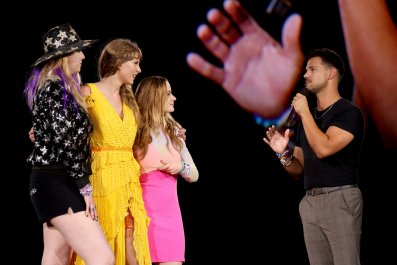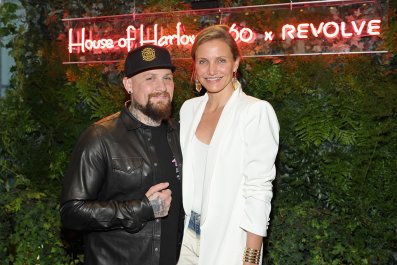Former President Donald Trump shared a series of images on Truth Social Sunday night suggesting that superstar Taylor Swift and a group of her followers called "Swifties for Trump" had endorsed him in the 2024 presidential election.
Many of the images, including one of the singer-songwriter dressed as Uncle Sam with the caption, "Taylor Swift Wants You To Vote For Donald Trump," appear to have been generated by artificial intelligence.
He wrote in one of the captions, "I accept!"
In 2020, Swift backed the campaign of Joe Biden and Kamala Harris, and there is certainly no love lost between her and former President Trump, whom she has accused of "stoking the fires of white supremacy and racism."
Swift, however, has yet to endorse any presidential candidate this election cycle.
The posts were met with outrage on social media, both by Trump's critics and fans of the megastar singer-songwriter. Some legal analysts believe Swift has grounds to sue the Republican nominee over the AI-manipulated "false endorsement."
"I hope this inspires every Taylor Swift fan to vote for Harris. And every music fan. And every person who cares about an artist's image & prestige stole by a criminal politician. And everyone who supports women's rights. Oh, and I hope Ms. Swift sues Trump back to the Stone Age," attorney and former U.S. Army prosecutor Glenn Kirschner wrote on X, formerly Twitter.
One of the images in Trump's post—of a woman in a white "Swifties for Trump" T-shirt—is not fake. One image showed Jenna Piwowarczyk wearing the homemade T-shirt to a Trump rally in Racine, Wisconsin, in June. Piwowarczyk went on to explain her decision to start the movement in a YouTube video.
"By focusing more on the AI photos than on the REAL person in the photos that Trump shared, I think the media are missing an opportunity to recognize that, of all the millions of Taylor Swift fans, of course there will be many who support Trump and conservative values and also love her music. We exist. We are real," Piwowarczyk wrote in a statement shared by Wisconsin Right Now, a Wisconsin-focused news platform, on X.
There is also evidence of an online "Swifties for Trump" movement. In a TikTok video posted by user @trendyandspendy, a woman can be seen posing in a bright pink MAGA hat.
In an emailed statement to Newsweek Monday night, Trump spokesperson Steven Cheung wrote, "Swifties for Trump is a massive movement that grows bigger every single day. While [Democratic nominee] Kamala Harris is guilty as sin for all the hurt she has caused every American."
Newsweek contacted Swift's representatives for comment by email Monday afternoon.
Jessica Silbey, a professor at Boston University School of Law and an intellectual property and constitutional law expert, told Billboard Monday that Trump's fake endorsement post likely violates Swift's right of publicity, which controls how your name, image and likeness are used by others.
"Everyone enjoys a right of publicity," Silbey told Billboard. "This kind of use—being made to say and seen as believing things you don't—is at the core of the right."
Sibley also told Billboard that Swift could look to sue Trump or his campaign for defamation over claims that the false presidential endorsement harmed her reputation.
Last month, a bi-partisan NO FAKES Act was introduced in the Senate that aims to protect individuals' voices and likenesses from AI-generated replicas. The act would "hold individuals or companies liable for damages for producing, hosting, or sharing a digital replica of an individual performing in an audiovisual work, image, or sound recording that the individual never actually appeared in or otherwise approved—including digital replicas created by generative artificial intelligence (AI), according to a press release on Democratic Senator Chris Coons' website.
In addition, 10 states, including Swift's home state of Tennessee, have enacted legislation to regulate deepfakes, which could give her additional room to sue Trump or his campaign.
Neama Rahmani, president and founder of West Coast Trial Lawyers, told Business Insider, "Swift could sue Trump and those who misappropriated her likeness by creating AI-generated images." He continued, "Privacy torts protect people from having their name, image, or likeness used without their permission. Manipulating it using AI doesn't change things."
Rahmani pointed to the tenacity of Swift's lawyers and said, "I wouldn't be surprised if they send the Trump campaign a cease-and-desist letter at a minimum," he told Business Insider.
James Walker Jr., an entertainment attorney who represents the estate of Isaac Hayes, recently filed a copyright infringement notice demanding the Trump campaign pay $3 million in licensing fees for using Hayes' composition, "Hold On, I'm Comin'" at his campaign rallies.
Walker told Business Insider that he believes Swift should pursue legal action.
"Taylor Swift is a billion-dollar brand," Walker said. "She probably has her name trademarked, just like Aretha Franklin and others I've represented own their trademarks. You have to protect your brand, your trademark, and when you don't respond immediately, that's conveying that you're accepting this, and then others will do it.''
Paul Michael Wilson, a trademark expert at Walker & Associates, cited to Business Insider that the Lanham Act of 1946, the federal legislation in place that controls and regulates trademark laws in the United States, gives Swift legal grounds to sue Trump.
"This is really bad—somebody should have told him not to do that," Wilson laughed as he spoke with Business Insider. "Like, really?"
However, suing Trump over just one image or a series of posts would certainly be arduous and expensive. Some legal analysts wonder if a defamation or copyright lawsuit —and the publicity that would surround the action—would be worth it for Swift.
Woodrow Hartzog, also a professor at Boston University School of Law, told Billboard that he's "skeptical the juice would be worth the squeeze." He added, however, that Swift could take on Trump with a real 2024 endorsement, potentially of his opponent, Democratic nominee Kamala Harris.
"I think Swift probably has more effective political rather than legal recourse here," Hartzog told Billboard.
Disclaimer: The copyright of this article belongs to the original author. Reposting this article is solely for the purpose of information dissemination and does not constitute any investment advice. If there is any infringement, please contact us immediately. We will make corrections or deletions as necessary. Thank you.




